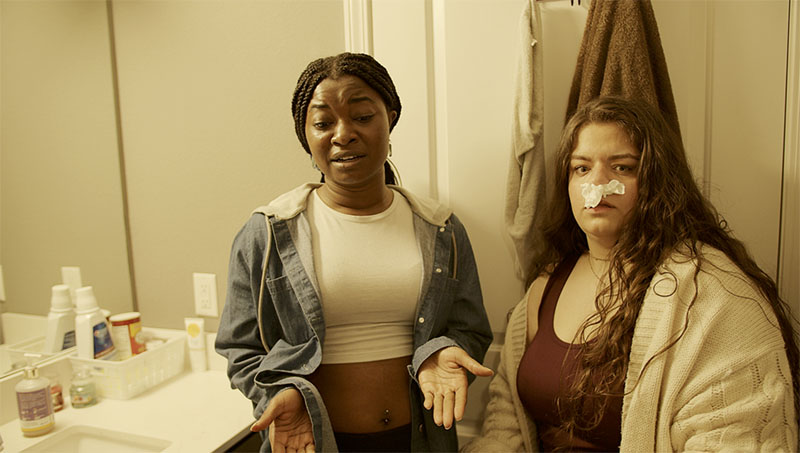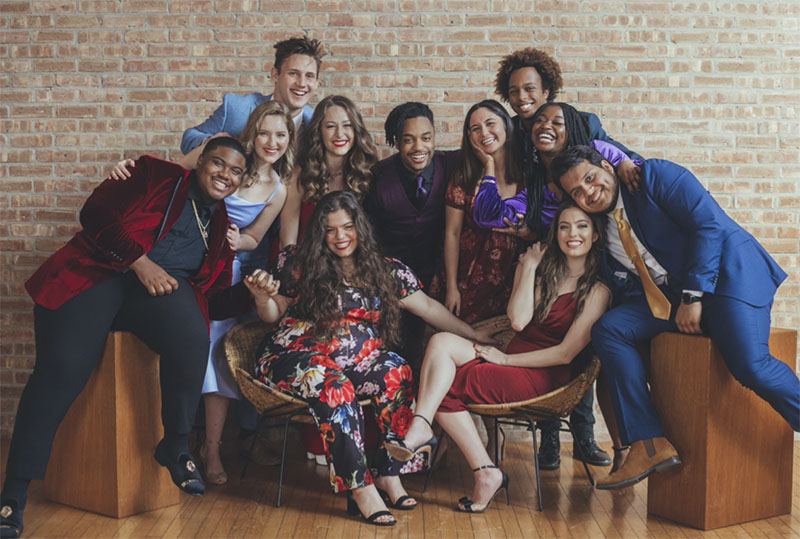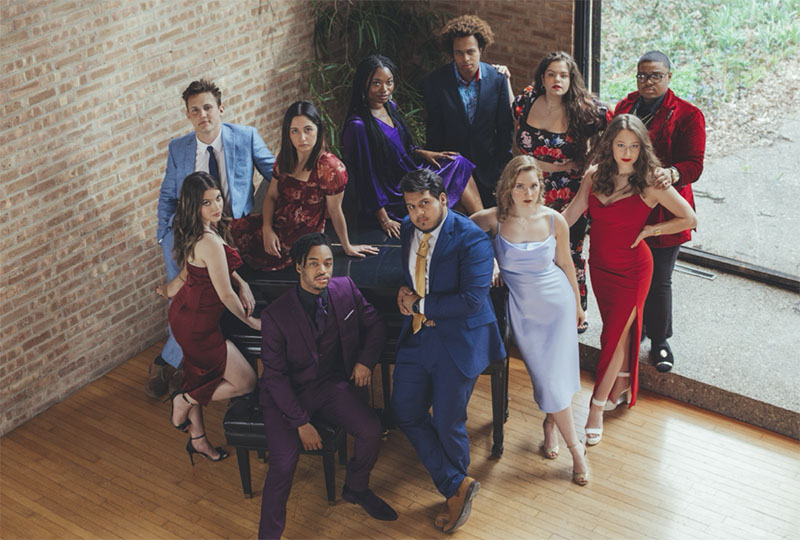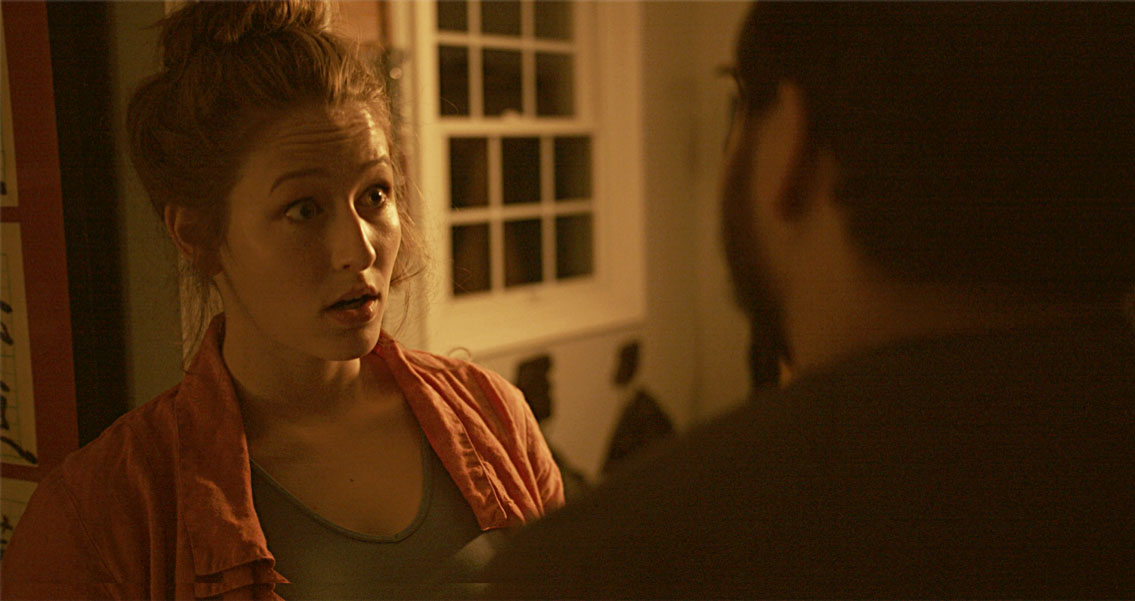Graduate acting showcases typically take place in-person, live, and in front of as many casting agents as possible. But this year and the 2021 graduating class are anything but typical.
The 11 acting students departing from Illinois Theatre this year have engaged in a unique set of artistic processes and outputs shaped substantially by a global pandemic, civil unrest, and racial revolution. One of these artistic endeavors, known to acting students around the country as an essential career boost, took a particularly interesting turn. The traditional showcase format was shaken up at Illinois for the first time last year when COVID-19 lockdowns began. With little warning, the 2020 graduating class was forced to translate what had been rehearsed as an in-person production into film in a matter of weeks. This year’s graduates thankfully had more time to prepare a virtual performance, which will be available on their Youtube channel on May 3rd, as well as their own website and Instagram page.The Illinois Theatre Acting program concentrates on stage work, so the 2021 class has been working with this curveball for the past year in preparation for its showcase.
I recently had the chance to sit down with three graduating actors to discuss the process of putting the showcase together, particularly amidst the country’s revitalized conversation around social justice, as well as what makes their class unique and what the future may hold post-graduation.
Smile Politely: Tell me a little bit about how the idea for the format of this year’s showcase came about.
Charlee Amacher: We got on Zoom as a whole class, and we were just talking about what we liked from last year’s website, and then what we didn’t like and what we want to keep, not keep, for our website.
Fabian Guerrero: Luckily, we’re not the very first group to try and do this. Last year they had to really come up with something on the spot. It was weeks before they were actually going to do their in-person, and then they had to shift online. So we basically took their website, their formatting, and used it as a good stepping stone. But the idea was, if everything is going to be filmed, let’s try and really make this high quality… So like, a couple scenes were staged like theatre scenes, but they were reeled back a little bit and made for the screen. The thought was: let’s create something to give interested parties, a nice little 30 to 40 minute movie of what our class can do skill-wise, range-wise, and in a scene with another person.
Uche Nwansi: Last semester Aaron Muñoz was like, “Get 20 monologues and scenes, and we’re going to just read them all in class and then pick which scenes are working.” And then he assigned us the scenes. We got to pick our top three that we liked out of the 20 and our top three scene partners, and then he just put those together. And for the most part everyone ended up with who they wanted to. I ended up doing two scenes, some people are doing a scene and a monologue… Behind our like photo shoot: we were like, “Jewel tones, everyone dress up, wear suits, wear dresses, wear heels, lipstick, false lashes, all of it.” We were inspired by one of the NYU showcases, and we saw that they kind of looked like housewives with really nice furniture and stuff. And we were like, “We want that.”

From left to right: Uche Nwansi, Charlee Amacher. Photo courtesy of Fabian Guerrero.
SP: What did the process of putting everything together look like for you?
Amacher: For me, it was making sure people answered their Groupmes, making sure people got to Zooms, and making sure that everyone’s voices were heard. Because I know a lot of times it can kind of be meshed together, and I am always trying to make sure everyone is comfortable, safe and happy with the product that we’re eventually going to be putting out… making sure that yes, I hear all these people… let’s try to make something that meshes together.
Guerrero: We’ve had a lot of different work done by a lot of different people. We’re all reaching out to agents, theater directors, different types of casting directors. So we’ve been doing that on our own. We’ve also been the ones coming up with our own content in terms of our headshots, our mission statement, our bios, our reels. And then we’ve had a couple of people take point. Zoe Replinger is our producer, so she’s kind of been heading the logistics, organizing from the top down. Stasia Kasimos and I have been in charge of leading the website design.
Nwansi: Me personally, I filmed in front of the Canopy Club… I did a scene from The Get Down with Will Burke and we filmed that in front of the Canopy. We picked our scene, and then we had a meeting with Aaron and we talked about possible locations. And then we talked about, you know, just being ready for the day of filming. We rehearsed on our own a bunch and then we rehearsed with Anderson a bit, but didn’t really rehearse again with Aaron. And then we just shot one day. And he did coverage, we both got our own coverage and then all these other filming terms, whatever. But we filmed in the early morning and there weren’t really notes, there wasn’t any direction. These scenes are really self-directed.
SP: What was the filming process like, especially given COVID restrictions?
Amacher: Oh, that was fun. I really liked it. I like being on set, I like videotaping and everything… We did a lot of it ourselves. We kind of took control of what we wanted to do… Our class chose days to help certain people, and we signed out a sheet to see when we were all free and available. And it was kind of nice because all of us were putting in time, literally putting in time, to help each other out.
Guerrero: We have two-person scenes as well as some monologues… We had to figure out the scene itself first. And so we have a wide array of different things. We have a scene from Disney Pixar’s The Incredibles… original pieces, as well as standard movie things that you might have seen. And some straight from the stage as well. So it’s been finding these pieces, but then also creating a really specific circumstance that might not necessarily be related to the piece to help create a nice little story in that moment. So it’s not like someone is trying to figure out, “Oh, what’s this from?” Or, “What happened before?” And so each can live independently and thrive on its own. And then we also have Muñoz, who has invested in a bunch of professional grade equipment, camera, boom, lights. And so it’s been a lot of scouting locations, figuring out where we can set up, where’s a great place that will create a good environment for the scene and the actors.
Nwansi: Sometimes we had to do filming during Monday, Wednesday, Friday when we have our other acting classes, and a time would overlap and people would have to miss class so it was kind of really messy… But the thing about our showcase that gives leverage is that we shot on location. I’ve been kind of looking at other schools’ showcases, and people have just been like, “If we were to do this as like a real live showcase we’d be on a stage in a theater space in the city.” So I’ve seen a bunch of schools take their showcases and, you know, bill them as being onstage, but in like a black space or something. Like, there’s nothing else there. So I do appreciate that… we’re in the situations of our scenes.

Photo of the 2021 BFA Acting class. Top row (left to right): Latrel Crawford, Jenna Kohn, Charlie Bauer, Zoe Replinger, Leojae Bleu Steward, Caitlin Lydia McDermott, Will Burke, Uche Nwansi, Fabian Guerrero. Bottom row: Charlee Amacher, Anastasia Kasimos. Photo by David J. Pollack. Photo courtesy of Fabian Guerrero.
SP: Can you talk more about adapting your theatrical training for film?
Amacher: We just kind of did what we would usually do for theatre. Yes, we had to worry about how close the camera is, we had to worry about all that, but the same rules apply… Like our given circumstances, who we’re talking to, all that stuff; that still all applies. For me it wasn’t difficult per se. And also I’ve had training for film as well, so that was easier for me than probably most people. But yeah, it was basically just trying to wrap up “us.” And also, we’ve grown, at least for me— and I hopefully can speak for my class— but we’ve all grown tremendously throughout the four years, so… accepting who we are and then implementing that into our work, that’s what was definitely different than any other times when we were acting.
Guerrero: And it’s been really great to have [the scenes] on film, because it kind of gets rid of the pressure of a one-and-done showcase. Having takes and having those different options, and instant feedback, and the complete permission to just go out there and try and the next day try something else, has been really great… A lot of us really analyzed our strengths as actors in finding pieces. And so I know for me specifically, one of my strengths is playing like a more “mature” character, someone who’s older, a little bit more experienced, has a little bit more gravitas in what they might have gone through in life… And so I knew instantly I was like, okay, so that needs to be a brother, a mentor, a father, like that needs to be something in that role where I can really lean into that… Charlie Bauer, he is by far the best internal thinker I’ve ever seen, like the way he processes information is just great. And so having a scene where he… just got told his wife is going to divorce him, and seeing him process that on screen— that’s his money shot. So being able to see people really capitalize on the skills that they’ve learned, and have really worked on, and play it up during the scene, is great. It’s showcasing the best work that these people could do.
Nwansi: So this is really my first semester ever doing on camera things. I’ve never really shot anything… as professional as what we’re trying to do here. We have an acting-for-the-camera class with Nisi, and that was really the most helpful for learning skills for being on the camera because we didn’t really get a lot of training on how to be in front of the camera during our showcase classes… But you know, the world is shifting and things are going to be on camera, so I’m excited for that and want to be prepared for that.
SP: What are you hoping the showcase will convey to viewers, particularly casting agents?
Amacher: I feel like this was the round where we picked what we wanted to do, we read the scenes that we wanted to read for. And yeah, picking the scenes that represent us well and picking the monologues that represent us well. And we were honing in on ourselves. So I feel like hopefully this will be a good representation of who we are and hopefully what we can grow into as artists… We’re ready for you! Yeah, we’re just ready. We’re ready to dive into it. We’ve just grown so much, and I’m so proud of who we are. We’re such a strong class, and it’s so amazing to see not only just the actual website and our group photos, but the actual work, and us as people, how much we’ve grown. So yeah, that’s what they’ll be seeing.
Guerrero: We have the skills and we have the experience, we know the repertoire… We’ve studied all the things. But we’re also here to rock the boat. We’re not here to step in line. And so a big thing for us is changing the face of American theatre and changing the look of film. A lot of that goes into representation of minorities on screen… if a person might be submissive in a certain situation, [we’re] finding a way to advocate for that person in a way that’s like, they have their own struggles and also their own ideas of what they deserve. And not just this idea that you might have traditionally have kind of observed or seen from watching this character and having like, pity for them. And so it’s really creating full ideas of humans.
Nwansi: I hope that I am booked in a movie! Well first of all, I hope I’m signed with an agent… I don’t graduate till December so I don’t have to be signing this springtime, but would be helpful since I’m doing all this work now and I won’t be doing another showcase next spring. I hope that I get the attention of good agents. I hope that people see that I am an actress in progress, and I have a lot to offer. And I’m really open to getting better and doing good work. And I think our whole class is too. I just hope they see that this is not just potential, this is potential and hard work. And we’re full people that have wants and passions that are also outside of theatre. Like our whole class, we love theatre, but we also like to have other things that we love… And I definitely like activism and all of these other things. I just hope that there’s a place for me in this entertainment business that allows me to still be myself… All these black people are dying in the streets and I can’t stay quiet any longer, and that’s just a thing that I speak about often, and it’s a part of everything I do. That could scare people off, unfortunately. So if there’s not a space for me then I’ll just make that space.

Top row (left to right): Charlie Bauer, Caitlin Lydia McDermott, Uche Nwansi, Will Burke, Charlee Amacher, Latrel Crawford. Bottom row: Anastasia Kasimos, Leojae Bleu Steward, Fabian Guerrero, Jenna Kohn, Zoe Replinger. Photo by David J. Pollack. Photo courtesy of Fabian Guerrero.
SP: Obligatory question: what are your plans post-graduation?
Amacher: Chicago. If not, my mom’s room.
Guerrero: You know, it’s so funny, I’m not scared at this point. It’s like, it’s gonna happen. Whatever’s gonna happen is gonna happen. And I’m here for it. I’m here to play it by ear and march forward. I’m going to be moving to Chicago in the fall, just because I have a lot of home ties there, but then I’ll be heading to New York City in 2022 as soon as the opportunity comes back again in, you know, not only Broadway, but Off Broadway, all the repertory theaters around there too open up. That way, there’s just a bevy of places I can look into hopping on projects or getting work. So yeah, Chicago, then New York, New York.
Nwansi: I don’t have any set concrete plans after I’m done with school, and I don’t even have any set concrete plans about what I want as a job. I know people keep asking that: “What do you want to do? What do you see yourself doing?” … I just want a job that pays me well, that I enjoy, that I’m passionate about— because I literally cannot do work if I’m not passionate about the work. It is so hard for me to accomplish anything that I don’t actually have a care for. And acting is that thing that I do care about. So I just want some gigs that I love, or can find love for. I just want to enjoy acting… I’m actually getting a dual degree in International Business and Acting. So I finish my studio Acting program this May because I’ve finished my classes and all the coursework, and in the fall it will really just be me wrapping up.
SP: How do you feel like your training has prepared you for those goals you just outlined?
Amacher: Life is too short to not do what you want to do. It is so damn short, that you just got to go for it. You’ve got to trust yourself. That’s, that’s really it. And also, you won’t have time to do things the way that you want to, nothing’s gonna be perfect, and that’s okay. At least you’re doing it. So just jumping on any opportunity that you want to take— that should be the number one thing, not waiting for the right time or the right moment. It’s never going to happen, and you’re going to be probably tired and everything, but never wait for the right moment because it’s nonexistent, and the right moment is now.
Guerrero: I feel so thankful to have a great base of what a good practice is in terms of learning my stuff, and putting it on its feet, and experimenting, and researching. And also having a good system for listening and collaborating with others, especially when being directed or instructed. And to me, to be able to still have my own ideas… and finding that really happy medium where I’m still alive in the character, the character’s still there, and we’re also producing the vision. So I feel like I’ve been so well-prepared in being a team player and going there to do my job and do my job well… Someone said, “The reason that you are cast is because the character needs your soul to finish the story.” And I think that’s such a beautiful way to think about it. Because a lot of people think about, “Okay, how can I be the character?” But it’s really interesting to think about how you can help influence the character, or how you can live inside the character. And I just think that’s such a great way to make it personal and specific. And also just fun. Yeah, it’s fun to just live in pure catharsis.
Nwansi: I definitely think that our department has given me the tools that I need to go out and exist in the world and be an actor, even though I don’t maybe use all those tools right now. I’ve taken hella notes for the past four years and I have so many notebooks that have been filled, and I know one day I’m gonna need to go back to my notes and figure something out. So I think the great thing about our department is that we’ve learned a lot of things. Maybe we’ve learned too many things to really even specialize in any of it. But I guess it’s kind of nice because some things will work for me that don’t work for someone else in my class, and some lessons will stick for me that don’t stick for someone else. So I feel like out of all the training, there are things that everyone in our class can hold on to. And the biggest goal for our department that they talk about a lot is preparation.
SP: Is there anything else you want people to know about you, the showcase or anything else?
Amacher: We’re all really great people, we all have such strength and power, and whether or not, depending on wherever our paths go, like, we’re set. And I feel very confident in our class that we’re going to make huge strides.
Guerrero: Go see it. A lot. Online. See it multiple times. RSVP on the website. And we would love to hear feedback… We’re thankful for a robust testing system and the opportunity to have done work… There are places and people who haven’t been able to. And so it’s been a lot of work this year, but we haven’t been able to see it. And so we want to be able to share it. And we’d love to hear what people think. So feedback is always welcome.
Nwansi: We are classy actors ready to, you know, go out and be ourselves, change the American Theatre with our strong opinions. Our class has four Black people in it, a Latino man, and an Asian girl. Our class just looks different than everyone else’s class. And we’re just trying to represent ourselves in the best light and let the people know that we’re ready… If you’re a casting director or agent, give me a chance! Just give me a chance. I want people to know… respect Black women! Respect melanated people everywhere. Black Lives Matter, but they always do. My Black life matters and it’s important… I just want people to know that we worked really hard. Over the past four years our class has worked really hard. We’ve been called the “trouble” or “problem” class for all four years so we’ve been doing this hard work. Interesting how the “problem” class is the class with the most Black people. But anyway… [my classmates] are like war buddies and people that I’ve like gotten to know really well for the past four years. We’ve spent hours and hours and hours together, and we know the good and bad. These people have seen me sobbing about crazy things, and all these, you know, special experiences that you get as actors in training. So I guess I just want people to know that I’m grateful for this experience, as hectic and crazy and unjust sometimes— but joyful— as it’s been. It has really shaped me into the woman I am today and I would not change that. Even though this is a PWI and it’s corrupt in a lot of ways. I’m a survivor story: a black woman that is getting through this system… Oh, and all cops are bad. All cops are bastards.
Learn more about the University of Illinois BFA Showcase, Class of 2021 on their website.








